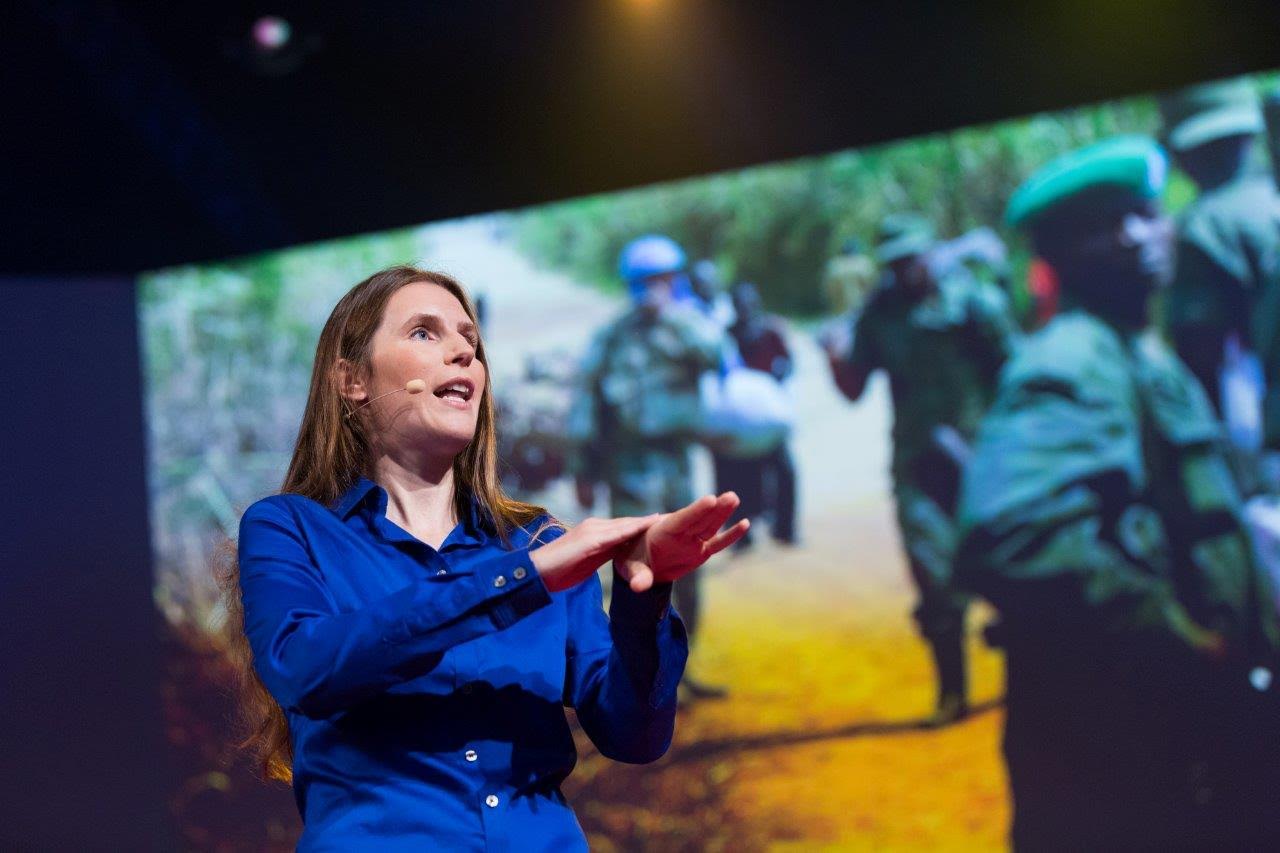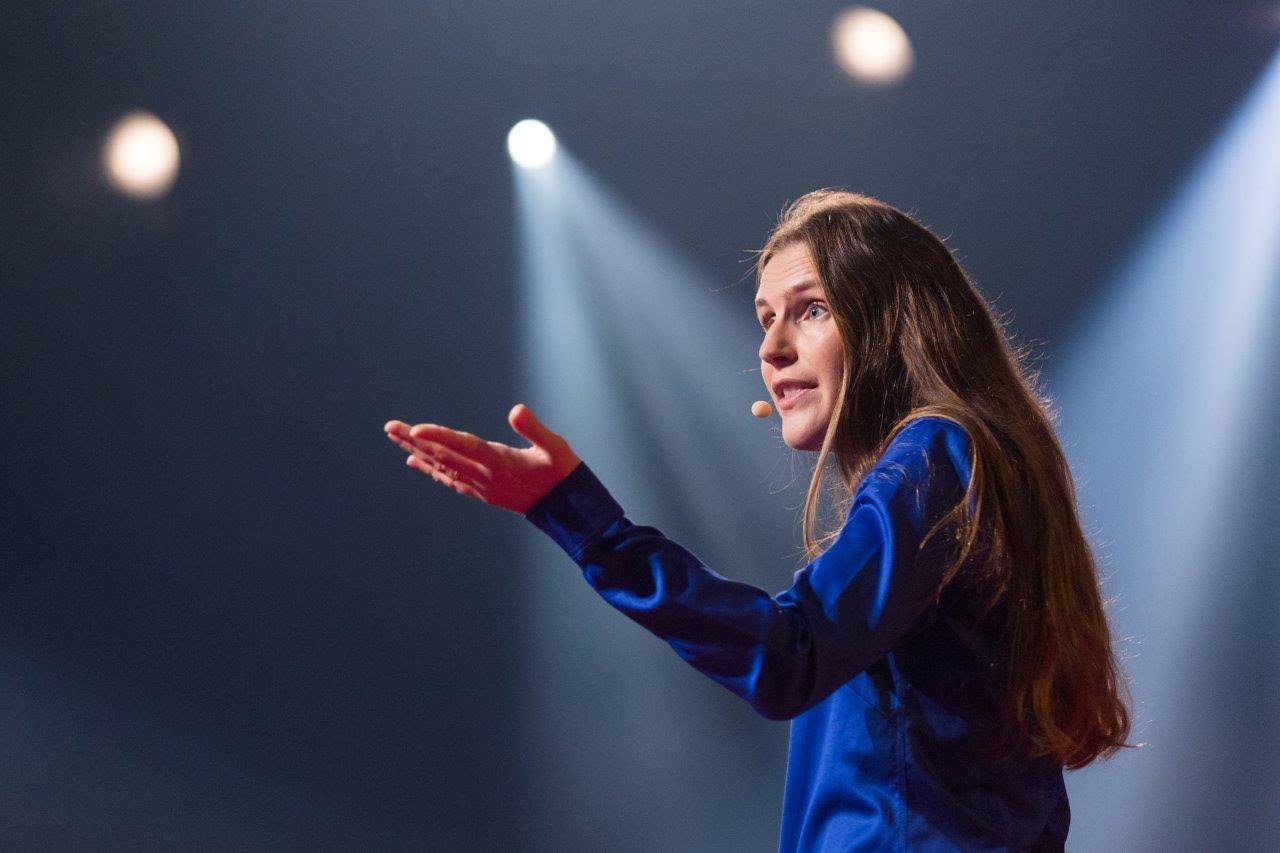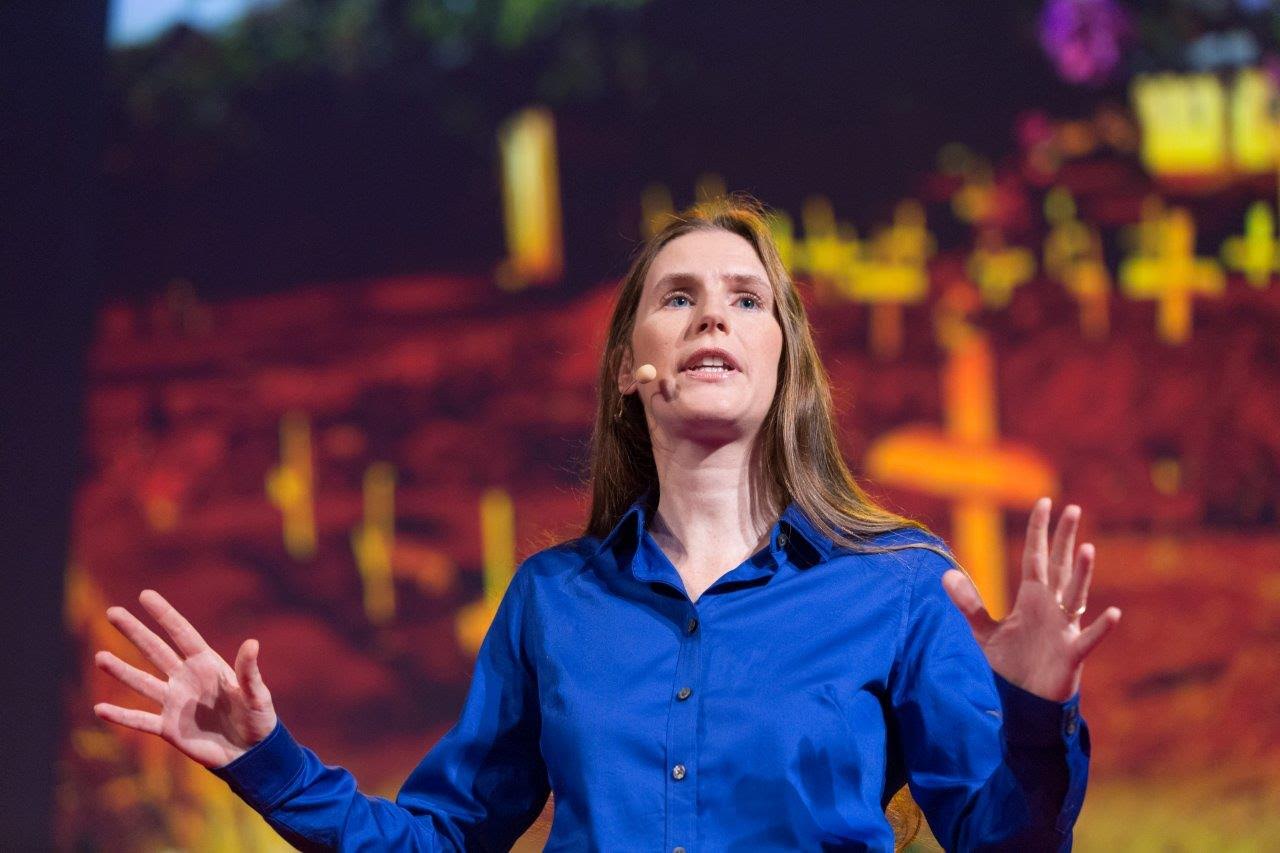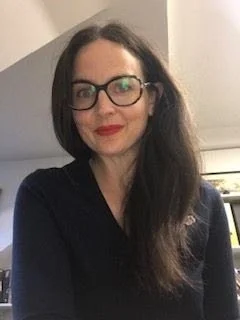Séverine Autesserre
/ASSOCIATE PROFESSOR | BARNARD COLLEGE, COLUMBIA UNIVERSITY
What is the most rewarding aspect of being a professor at Barnard College in New York City?
The first thing I love about being a professor is that I can think about interesting and stimulating questions all the time. This is pretty much my entire job, whether we’re talking about teaching or research. I get to think about questions like ‘How do we build peace?’ or ‘How do we end violence?’, or ‘How do we organize our societies so that people can lead the most fulfilling lives possible?’ I get to do this on a daily basis as part of my job, and I think it’s the most rewarding aspect of being a professor.
At Barnard (the women’s college at Columbia University), I specifically like three things about my job. The first is that I get to interact with very interesting people all the time. My colleagues and students at Barnard and Columbia are amazing and extremely bright, and on top of that I get to meet very diverse and fascinating people for my research – in interviews, conferences, or when I am presenting my work. I get to meet people with different points of view, different experiences, and from different backgrounds, and this is extremely rewarding.
The second thing I love about Barnard and Columbia is the freedom that I have as a professor. I have a lot of freedom to research whatever I find most interesting. I have a lot of freedom to teach what I think is most useful to my students, and decide how I want to teach it. I also have a lot of freedom regarding how to organize my time. I am very busy and I travel a lot, but I decide what my schedule looks like. The only obligation I have is that I must be at school in New York during the academic year for five to ten hours a week to teach classes, hold office hours, and go to a couple of meetings. The rest of the time, I decide my own schedule. If I want to do research and travel, I can do so.
Finally, Barnard is a diverse and stimulating environment that encourages me to think outside the box and to be the best professor and researcher that I can possibly be, so I like the challenge.
Previously, you worked for various humanitarian and development agencies, including Médecins Sans Frontières. How would you describe the biggest challenges facing organizations like MSF today?
MSF and other humanitarian organisations face thousands of challenges – we could spend an entire week talking about this. One of the biggest challenges is how to raise enough funding to address all of the needs that they identify and how to respond to forgotten crises like the conflict in Congo.
My research over the past twelve years has focused more on peacebuilding organisations. These are slightly different from development or humanitarian agencies because their main goal is to build peace, rather than respond to humanitarian and development issues. For these kinds of organisations, the main challenge is how to be more in tune with the expectations of intended beneficiaries. In my opinion, these organisations have to transition from the standard top-down approach to a more locally-driven approach. In the standard top-down approach, international organisations and non-governmental organizations (NGOs) believe that expatriates know best. These foreign people identify problems and bring solutions to local people. I’ve said in my TED Talk and in my book ‘Peaceland’ that we need to include the intended beneficiaries from the start. They should be present in the design and planning of international peacebuilding efforts. The intended beneficiaries should be the ones to identify the main problems, the relevant solutions, and how best to implement these solutions.
Would you encourage young women to apply for a Fulbright Fellowship? How has the Fulbright Commission helped you gain success in your field?
I was awarded a Fulbright Fellowship in 1999 to pursue a Masters Degree at Columbia University’s SIPA. It was the first time that I was exposed to humanitarian aid and peacekeeping academically, and it influenced my decision to study these fields further. The Fulbright has helped me in my field and opened thousands of doors for me – I would definitely encourage young women to apply for the Fellowship.
Your academic publications focus heavily on your research in the Democratic Republic of Congo. To what extent did your work at MSF affect your career focus? Did you always intend to specialize in civil wars, peace, and humanitarian aid in Central Africa, or was this a result of the development work you’ve done in the region?
My first contact with Congo was when I worked as a humanitarian aid worker for MSF. I was sent to Congo in early 2001 as part of an exploratory mission. The Spanish section of MSF wanted to see if there were any programs that MSF could do in Congo. We had to evaluate the situation and report back to MSF. I had already been admitted to PhD programs in the United States, and I kept this in mind.
I arrived in Congo and discovered that MSF and other international and non-governmental organizations did not have a full understanding of what was going on. Part of my job was trying to understand the war in Congo and devise an analysis for how MSF could design good programs in Congo. I kept asking people to explain the situation, to give me a framework to understand the war in Congo. Every time someone would explain the situation to me, the next day, new events would happen, and my understanding of the situation would fall apart. For example, someone would tell me that it was a war between Rwanda and Congo, and the next day I would wonder why groups allied with Rwanda were cooperating with groups allied with Congo, and why there was in-fighting between Congo’s allies. Later, someone else would say that the war was an ethnic conflict between Group A and Group B, but you would still see fighting among members of Group A, and alliances happening between members of both groups. It was hard to understand what was going on, and there was very little research at the time. The Congolese conflict was a major crisis and people were not paying attention. When I returned to New York and started my Ph.D. program, I knew that Congo would be a fascinating country to research, and I could bring a lot to the table.
During your TED Talk on Mass Violence, you highlight the importance of local engagement in addressing large violent conflicts and criticize the dominant culture that pervades the development sector today. You also encourage international peacebuilders to work from the bottom up – engaging with local actors on both a macro and micro level to ensure sustainable peace. Two years on, do you think the international community has listened to your advice, or do you think there’s more work to be done?
It’s much more than just two years for me. The TED Talk was one of the final platforms that I used to disseminate ideas that I had started working on for my dissertation. The TED Talk really started as my dissertation project in 2003 (and I completed my Ph.D. in 2006). I published an academic article on this topic in African Affairs in 2006. My first high – profile media piece was my Foreign Affairs article in 2008, and then my book ‘The Trouble with the Congo’ was published in 2010. I had op-eds in The Global New York Times and The New York Times online in 2012, and I had various other scholarly articles published. The TED Talk was one more way to disseminate my findings in October 2014.
I had been speaking about mass violence and local actors for many years, and so it’s difficult to pinpoint any direct impact of the TED Talk. I also don’t think there’s any such thing as “the international community.” Do I think foreign interveners have listened to my advice? Well, there has certainly been a change in how international actors approach peacebuilding, especially in Congo. When researching my dissertation, I would ask diplomats, NGO workers, United Nations (UN) staff, and other actors about what they were doing to respond to local conflict and violence. Either they laughed at me, or they didn’t understand my question, or they assumed that I was speaking about sexual violence. The notion of working on local conflict resolution was so foreign to them. Ten years later, we at least have an acknowledgement that local conflicts matter, that local conflicts fuel violence in Congo, and that we should address local conflicts and create local conflict resolution programs. This acknowledgement among policy-makers, practitioners, academics, and in the media is a big step forward.
However, it is not enough. Often, what we see is only lip service to the idea of local conflict resolution. For example, a UN representative could say that local conflicts matter, but at the same time they continue to focus most of their financial and human resources on national and international conflicts. There is much more work to be done.
The other important point that I want to make is that, although I was instrumental in helping these actors act differently and understand the importance of bottom-up approaches in Congo, I was not the only one doing so. There were other academics, practitioners, and policy-makers saying the same things, and I do believe that the progress is a result of our joint efforts. These include Koen Vlassenroot, who has written extensively on Congo and local violence, and was a big inspiration for my work, and Stathis Kalyvas, who has published several articles and a book explaining that bottom-up conflicts fuel violence in many war and post-war environments. Additionally, there were also people like the staff members at the Life and Peace Institute and diplomats including Lena Sundh, whom I talk about a lot in my Trouble with the Congo book.
Why do you consider it important to be one of Foreign Policy Interrupted’s Fellows?
I received fantastic training on how to better interact with the media and how to use my expertise on war and peace in the most effective way. I think that it has improved my ability to answer media requests and has helped me move closer to achieving my ultimate goal, which is to create and use knowledge to help decrease violence.
Do you have any role models?
Yes, but it’s not just one person. When I think of role models, I think of all the women that I’ve met who managed to be kind and supportive of everyone, especially people who are below them on the totem pole, in addition to being super smart and successful women. I think about civil society activists like Leymah Gbowe, many of my academic colleagues like Libby Wood, Kim Marten, Page Fortna, Erica Chenowetz, Debbi Avant, Martha Finnemore, and Cecelia Lynch. I will also mention NGO representatives like Catherine Dumait-Harper, who is the former representative of MSF to the UN, and who has become a very dear friend. Also, diplomats like Lena Sundh. I could go on and on.
I prefer to have role models that I know personally because I can relate to them.
I’ve also had male mentors like Timothy Mitchell, Michael Barnett, and my husband Philippe Rosen as well.
Are you reading any books at the moment? Any recommendations?
I love books. Here are a few recommendations, among many:
For work, Steve Pinker, ‘The Better Angels of our Nature’
For work and fun, Todd Moss, ‘The Golden Hour’ and ‘Minute Zero’ – these two are about foreign policy in Africa.
For pure fun, Ken Follet’s historical novels: ‘The Pillars of the Earth,’ ‘World Without End,’ and ‘The Century Trilogy.’ These are amazing novels.
You can also look at the bibliographies of my two books, and that will give you a sense of the books that I think are absolutely fantastic. I also put all of my syllabi online, so you can find many interesting readings there.
Education: BA in Political Science at Université Paris-Sorbonne | MA in Political and Social Sciences at Sciences Po | MA in International and Public Affairs at Columbia University | Ph.D. in Political Science at New York University | Post-Doctorate from the Program on Order, Conflict, and Violence at Yale University
Previously worked at: Médecins du Monde | Médecins Sans Frontières | New York University | Yale University
Find Séverine Online: Twitter | Facebook | Website
Inspired by Séverine’s career? Check out job opportunities and internships at United Nations OCHA | Médecins du Monde | Médecins Sans Frontières | Action Against Hunger
Apply for a Fulbright Fellowship
Apply to Foreign Policy Interrupted’s Fellowship Program by December 21, 2016!
TED Talk: To Solve Mass Violence, Look to Locals
Books: Peaceland: Conflict Resolution and the Everyday Politics of International Intervention (Cambridge University Press, 2014), The Trouble with the Congo: Local Violence and the Failure of International Peacebuilding (Cambridge University Press, 2010)
Recent Publications: "Here's What Congo Can Teach the World About Peace," Monkey Cage, The Washington Post, USA (October 2016), "Trouble in Peaceland," Foreign Policy, USA (October 2015)
Visit http://www.severineautesserre.com/media/ to see all media publications
Exclusive Interview with Aisha Babalakin on November 23, 2016











